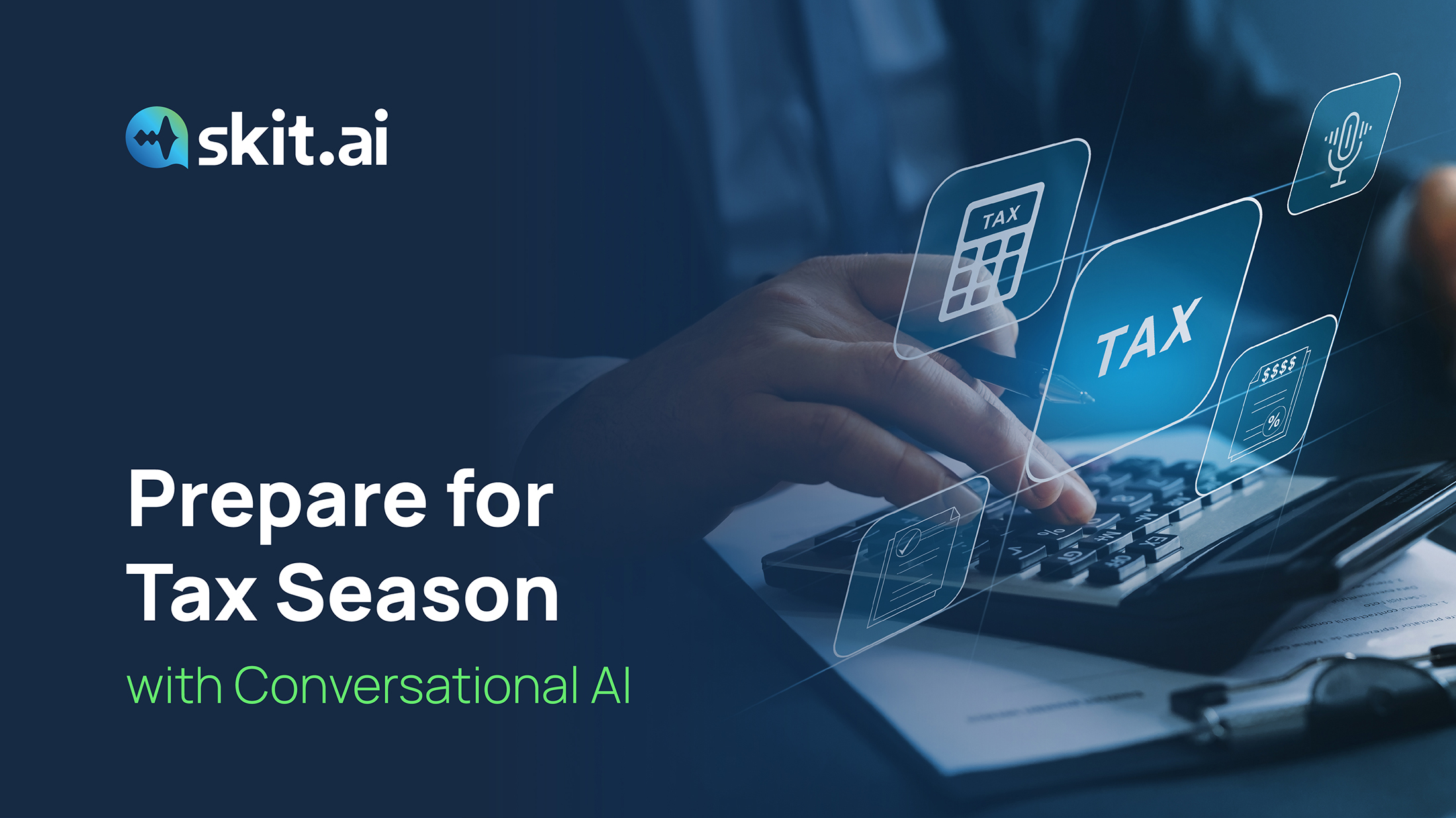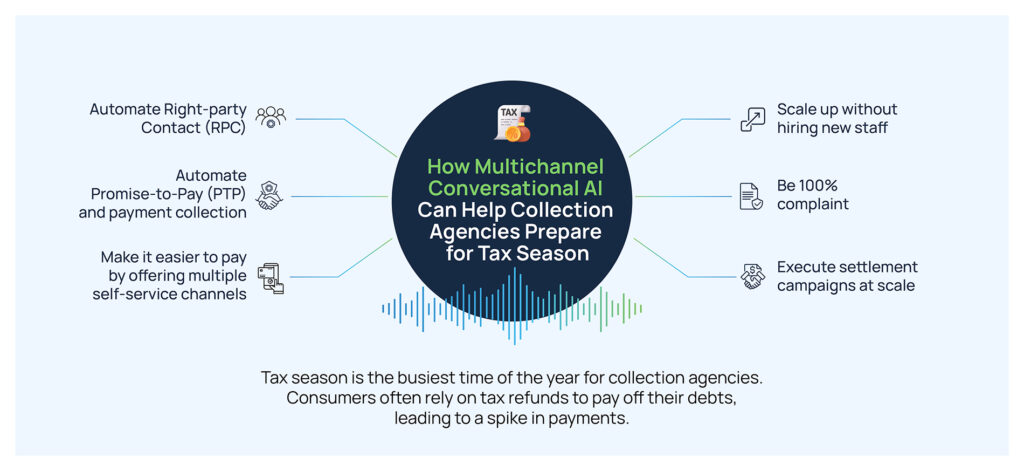Simone Somekh
September 13, 2024

Hello! Welcome to Skit.ai. Click here to book a demo.
September 13, 2024

Tax season is the busiest time of the year for collection agencies. According to a recent report, at least 29% of Americans say they plan to use their tax refunds to pay off their debt. With a majority of U.S. residents receiving a tax refund from the government during this season, the number of people who will wisely take advantage of the reimbursements to pay off their debt is high.
In 2024, the average tax refund for individuals in the U.S. was $2,869.
Creditors and debt collection agencies know it’s important to take advantage of this window of opportunity to maximize their recovery rates and agency margins. During tax season, the industry usually experiences a peak in payments, paired with a general openness of consumers to engage with collectors. Many consumers will be relying on tax refunds to pay off their debt at this time of the year.
Now is the perfect time for agencies to prepare for tax season and the surge in outbound and inbound calls. In this article, we’ll explain how Conversational AI (the technology behind voicebots and chatbots) can transform tax season for the better, making it a less stressful and more profitable time for businesses performing collections.
While tax season undoubtedly represents a window of opportunity, it also presents several challenges for collection agencies. The best way for executives to tackle these challenges is to prepare in advance and to involve their collectors on the floor in these preparations.
Here are some of the most common challenges collection agencies face before and during tax season:
Hiring new collectors: To handle the surge in call volume, collection executives often seek to hire new collectors to join their staff. Hiring takes time and resources; over the last few years, it’s become more challenging to find new talent, as people are inclined to seek more flexible jobs, and salaries have become more competitive. You’ll need ample time to find new talent and train new hires.
Training staff to prepare for the season: Whether newly hired or seasoned, all collectors should receive the appropriate training before the beginning of tax season. All training materials should be easily accessible, focusing on the challenges and skills specific to this time of year.
Updating the agency’s compliance management system: Every agency should have a compliance management system, often found within the collections management software. This system is used to store and organize the current laws and regulations of the ARM industry. Before tax season begins, the agency’s compliance officer or manager should ensure that the system is up to date with the latest regulations, including state laws; outdated regulations should be removed. Additionally, this system should be easy to access and browse for collectors.
Planning a successful settlement campaign: The surge in collection volume encourages some agencies to offer small discounts for a limited time; other agencies take it to the next level by planning a wide-scale settlement campaign. For a settlement campaign, the agency focuses on a specific group of accounts, typically consumers with higher recovery rates and debt whose age falls within a specific timeframe. If the agency services third-party debt, then it also must coordinate the campaign with the original creditors. Executives must decide what balance reduction they are going to offer those consumers and the running time of the campaign. The entire process can make the agency extremely busy, and things are likely to get hectic for the collectors on the floor.

Conversational AI, the technology behind voicebots and chatbots, has become one of the favorite automation technologies in the accounts receivables industry. Conversational AI enables creditors and collection agencies to automate both inbound and outbound conversations with consumers across multiple channels—such as voice, text, chat, and email—making it much easier for executives to scale their collection campaigns without the need to hire additional or seasonal agents.
Skit.ai’s Conversational AI solution:
The solution easily transfers calls to your live agents when needed, so they can speak to the most engaged consumers and collect payments on-call.
It’s important to note that Voice AI is not IVR (interactive voice response), an outdated and unpopular solution commonly used in customer service. Unlike IVR, Voice AI can handle intelligent, two-way conversations with consumers.
Automation of consumer interactions with Conversational AI is transforming collections across the board, as it enables collection agencies to handle many more accounts simultaneously, recovering payments at a fraction of the cost. Additionally, this technology augments the work of live collectors, who are empowered to handle more complex cases and focus on more revenue-generating accounts; whenever agents get a transfer from the AI solution, they receive the context on the consumer’s previous interaction with the voicebot in real-time.
While this technology is helpful all year round, during tax season it becomes particularly essential. Here’s why:
Make it super easy for consumers to pay. Any roadblock in the payment process can significantly hinder the recovery of the debt. That’s why customer experience plays an important role, and making the payment as easy and frictionless as possible is a priority for your agency. Multichannel Conversational AI enables consumers to use their preferred mode of communication, making the recovery process smooth and pleasant.
No need to hire additional collectors during tax season: Conversational AI enables executives and managers to scale their operations, without the need to hire additional collectors during this busy season. This way, they can continue to rely on their trusted team and get the extra help they need from the virtual agents, which are unlimited in number and can handle thousands of conversations simultaneously. Collections with Conversational AI are significantly cheaper; additionally, bots don’t take a commission!
Fewer concerns about compliance thanks to AI: Executives can worry less about ensuring compliance with laws and regulations since the platform is fully trained to comply with regulations at the state and federal levels thanks to rigid guardrails and compliance filters. Unlike live collectors, the automated agent is always compliant and does not go off script.
Execute a smooth settlement campaign at scale: With Conversational AI, collection agencies can execute a settlement campaign at scale, reaching thousands of consumers in a very short amount of time to offer the settlement and collect the payments.
“We were seeking a way to boost collections cost-effectively and without the need to add additional workforce. We began by leveraging Skit.ai to run a settlement campaign during tax season this year, with the technology adapting to our seasonal needs and business model,” said Daniel Klein, CEO of Uown Leasing, a Florida-based provider of lease-to-own, flexible payment solutions for consumer products.
Klein continued: “I don’t think technology will eliminate people, but having the right point of intersection between technology and human capital is how you can scale operations and make your business successful.”
After implementing Skit.ai’s solution, the company experienced a significant surge in self-serve consumer payments directed through its online payment portal, facilitated by the AI solution.
While it’s never too early to get started, many agencies evaluate partners and vendors before Thanksgiving, just as the holiday season approaches and many U.S. residents are known to use their credit cards for holiday spending.
However, make no mistake: it’s also never too late! At Skit.ai, we pride ourselves on our fast and efficient implementation process. From the moment you adopt our Multichannel Conversational AI solution, you can go live and start using the platform in as little as 48 hours.
Are you ready to take the next step toward call automation with Conversational AI? Schedule a free demo with one of our experts to learn more!
The field of AI is advancing rapidly, especially in large language models. Prominent models like GPT-3 and GPT-4 have impressive capabilities in generating coherent, human-like text. However, these models face a significant limitation: they rely solely on the data they were trained on, often leading to outdated or contextually incorrect information. As a result, the […]
You are ready to adopt a Conversational AI or Voice AI solution for your contact center, or you are in the process of adopting one—congratulations! Now is the time to think about integrations. In this article, we’ll discuss the benefits of integrating your Conversational AI platform with various tools and applications to transform your tech […]